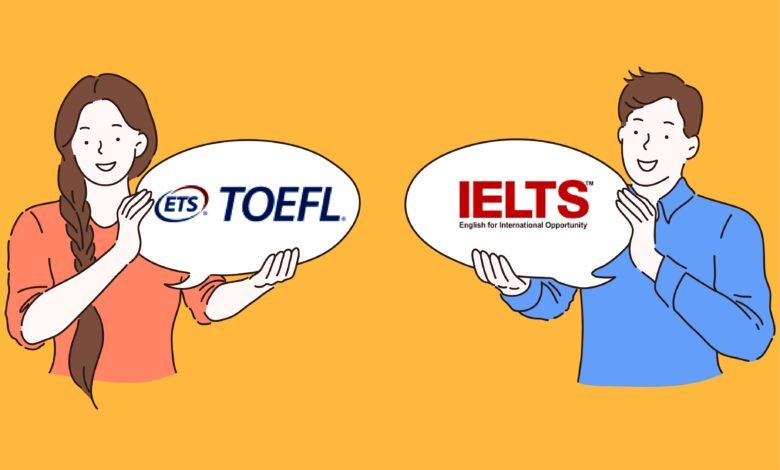IELTS vs TOEFL: Which is Better for You in 2025?
This comprehensive guide will help you understand the key differences, benefits, and challenges of IELTS vs TOEFL, enabling you to make an informed decision.

Choosing between IELTS vs TOEFL can feel overwhelming, especially if you’re planning to study, work, or migrate abroad in 2025. Both the International English Language Testing System (IELTS) and the Test of English as a Foreign Language (TOEFL) are globally recognized English proficiency tests, but they differ in format, scoring, content, and purpose. This comprehensive guide will help you understand the key differences, benefits, and challenges of IELTS vs TOEFL, enabling you to make an informed decision based on your goals, preferences, and strengths.
What Are IELTS and TOEFL?
Before diving into the comparison of IELTS vs TOEFL, let’s understand what each test entails.
IELTS Overview
The IELTS, administered by the British Council, IDP Education, and Cambridge Assessment English, is designed to assess English language proficiency for academic, professional, or immigration purposes. It offers two versions:
- Academic IELTS: For students applying to universities or higher education institutions.
- General Training IELTS: For professionals seeking work or immigration opportunities, particularly in countries like Canada, Australia, or the UK.
The test evaluates four skills: Listening, Reading, Writing, and Speaking, with a total test duration of about 2 hours and 45 minutes.
TOEFL Overview
The TOEFL, managed by the Educational Testing Service (ETS), is primarily designed for academic purposes, testing English proficiency for university admissions in English-speaking countries, especially the United States. The TOEFL iBT (Internet-Based Test) is the most common format, assessing Reading, Listening, Speaking, and Writing over approximately 3 hours.
Both IELTS vs TOEFL are widely accepted, but their differences in structure, delivery, and focus make them better suited for specific goals. Let’s explore these differences in detail.
Key Differences Between IELTS and TOEFL
When comparing IELTS vs TOEFL, several factors come into play: test format, scoring, difficulty, acceptance, and preparation requirements. Below, we break down each aspect to help you decide which test aligns with your needs.
1. Test Format and Structure
The structure of IELTS vs TOEFL varies significantly, impacting how test-takers prepare and perform.
IELTS Format
- Listening (30 minutes): Consists of four recorded conversations or monologues, with 40 questions. You’ll hear a range of accents (British, Australian, American, etc.).
- Reading (60 minutes): Includes three passages with 40 questions. The Academic version features academic texts, while the General Training version includes everyday materials like advertisements or work-related documents.
- Writing (60 minutes): Two tasks:
- Task 1: Describe a chart, graph, or diagram (Academic) or write a letter (General Training) in 150 words.
- Task 2: Write a 250-word essay responding to an argument or problem.
- Speaking (11–14 minutes): A face-to-face or video-call interview with an examiner, divided into three parts: introduction, individual talk, and discussion.
The IELTS is offered in both paper-based and computer-based formats, with the Speaking section conducted separately, often on a different day.
TOEFL Format
- Reading (54–72 minutes): 3–4 academic passages with 10 questions each, totaling 30–40 questions.
- Listening (41–57 minutes): 4–6 lectures or conversations with 5–6 questions each, totaling 28–39 questions.
- Speaking (17 minutes): Four tasks, including expressing opinions and summarizing information from reading or listening materials, recorded via a computer.
- Writing (50 minutes): Two tasks:
- Integrated Writing: Write a 150–225-word response based on a reading passage and a lecture.
- Independent Writing: Write a 300-word essay on a given topic.
The TOEFL is primarily computer-based (TOEFL iBT), though a paper-based version (TOEFL PBT) is available in limited locations.
IELTS vs TOEFL Verdict: If you prefer a face-to-face speaking test and a mix of academic and general content, IELTS might suit you. If you’re comfortable with computer-based testing and academic-focused content, TOEFL could be a better fit.
2. Scoring System
Understanding the scoring of IELTS vs TOEFL is crucial, as it affects how institutions evaluate your English proficiency.
IELTS Scoring
- Scored on a 0–9 band scale for each section (Listening, Reading, Writing, Speaking).
- The overall band score is the average of the four sections, rounded to the nearest 0.5.
- Example: Scores of 7.0 (Listening), 6.5 (Reading), 6.0 (Writing), and 7.5 (Speaking) yield an overall band of 6.75, rounded to 7.0.
- Scores are valid for 2 years.
TOEFL Scoring
- Scored on a 0–120 scale, with each section (Reading, Listening, Speaking, Writing) worth 0–30 points.
- The total score is the sum of all sections.
- Example: Scores of 25 (Reading), 27 (Listening), 23 (Speaking), and 26 (Writing) yield a total of 101.
- Scores are valid for 2 years.
Score Comparison
Converting IELTS vs TOEFL scores can be tricky, but here’s an approximate equivalence:
- IELTS 6.5 ≈ TOEFL 79–93
- IELTS 7.0 ≈ TOEFL 94–109
- IELTS 7.5 ≈ TOEFL 110–114
IELTS vs TOEFL Verdict: IELTS’s band system is simpler to interpret, while TOEFL’s point-based system offers more granularity. Check the specific score requirements of your target institution.
3. Test Difficulty
The difficulty of IELTS vs TOEFL depends on your strengths, learning style, and familiarity with the test format.
IELTS Difficulty
- Listening: Features diverse accents, which can be challenging for non-native speakers unfamiliar with British or Australian English.
- Reading: Academic IELTS passages are complex, but General Training reading is easier, focusing on practical texts.
- Writing: Task 1 (describing visuals or writing letters) requires concise, structured responses. Task 2 demands strong essay-writing skills.
- Speaking: The face-to-face format can be intimidating for shy test-takers but allows for natural conversation.
TOEFL Difficulty
- Listening: Uses primarily American accents, which may be easier for those familiar with U.S. media.
- Reading: Academic passages are dense and require strong vocabulary and comprehension skills.
- Writing: The integrated task (combining reading and listening) can be challenging, as it requires synthesizing information quickly.
- Speaking: Recording responses into a microphone can feel unnatural, especially under time pressure.
IELTS vs TOEFL Verdict: IELTS may be easier if you’re comfortable with diverse accents and face-to-face speaking. TOEFL suits those who excel in academic settings and are comfortable with computer-based testing.
4. Global Acceptance
A critical factor in choosing IELTS vs TOEFL is where and how widely each test is accepted.
IELTS Acceptance
- Accepted by over 11,000 organizations worldwide, including universities, employers, and immigration authorities.
- Preferred in the UK, Australia, Canada, and New Zealand, especially for immigration (e.g., Canada’s Express Entry system).
- Gaining traction in the United States, with many universities now accepting IELTS scores.
TOEFL Acceptance
- Accepted by over 11,000 institutions in 150+ countries, primarily for academic purposes.
- The preferred test for U.S. universities, though many also accept IELTS.
- Less commonly used for immigration purposes compared to IELTS.
IELTS vs TOEFL Verdict: If you’re targeting U.S. universities, TOEFL is often preferred. For immigration or study in the UK, Canada, or Australia, IELTS is the better choice.
5. Test Availability and Cost
When comparing IELTS vs TOEFL, availability and cost are practical considerations.
IELTS Availability and Cost
- Offered in over 140 countries at numerous test centers.
- Available in paper-based and computer-based formats, with frequent test dates.
- Cost: Varies by country, typically $215–$250 USD.
TOEFL Availability and Cost
- Available in over 150 countries, primarily as the TOEFL iBT.
- Test centers are widespread, but paper-based tests are limited.
- Cost: Typically $185–$300 USD, depending on the location.
IELTS vs TOEFL Verdict: Both tests are widely available, but costs vary by region. Check local test centers and fees before deciding.
6. Preparation Strategies
Preparing for IELTS vs TOEFL requires different approaches due to their unique formats.
Preparing for IELTS
- Listening: Practice with diverse English accents (e.g., BBC podcasts, Australian radio).
- Reading: Read academic journals (Academic IELTS) or newspapers (General Training).
- Writing: Practice summarizing charts/graphs and writing structured essays.
- Speaking: Engage in mock interviews to build confidence.
- Resources: Official IELTS practice materials, Cambridge IELTS books, online platforms like IDP’s IELTS Prep.
Preparing for TOEFL
- Listening: Watch U.S.-based lectures or podcasts (e.g., TED Talks).
- Reading: Practice with academic texts from journals or university websites.
- Writing: Focus on integrating information from reading and listening sources.
- Speaking: Record responses to practice fluency and time management.
- Resources: ETS TOEFL practice tests, TOEFL Go! app, online courses like Magoosh or Kaplan.
IELTS vs TOEFL Verdict: IELTS preparation requires adapting to varied accents and formats, while TOEFL demands strong academic skills and computer-based practice.
7. Which Test Suits Your Goals?
Your choice between IELTS vs TOEFL depends on your specific objectives.
Choose IELTS If:
- You’re applying for immigration to countries like Canada, Australia, or the UK.
- You prefer a face-to-face speaking test or a mix of academic and general content.
- You’re comfortable with British English or diverse accents.
- You’re applying to universities in the UK, Australia, or Canada.
Choose TOEFL If:
- You’re targeting U.S. universities or institutions that prefer TOEFL.
- You’re comfortable with American English and academic content.
- You prefer computer-based testing and recorded speaking tasks.
- You have strong note-taking skills for integrated tasks.
IELTS vs TOEFL Verdict: Align your choice with your destination and purpose—IELTS for immigration or UK/Commonwealth countries, TOEFL for U.S. academic settings.
8. Pros and Cons of IELTS vs TOEFL
Let’s summarize the advantages and challenges of IELTS vs TOEFL.
IELTS Pros
- Flexible formats (paper-based or computer-based).
- Face-to-face speaking test feels more natural.
- General Training option for non-academic purposes.
- Widely accepted for immigration.
IELTS Cons
- Diverse accents can be challenging.
- Speaking test may be scheduled on a different day.
- Writing Task 1 (describing visuals) requires specific skills.
TOEFL Pros
- Consistent computer-based format.
- Preferred by U.S. universities.
- Integrated tasks test real-world academic skills.
- All sections completed in one session.
TOEFL Cons
- Longer test duration (up to 3 hours).
- Recorded speaking tasks may feel impersonal.
- Heavy focus on academic content.
9. Tips for Success in 2025
To excel in IELTS vs TOEFL, follow these tips:
- Start Early: Begin preparation 2–3 months in advance.
- Take Practice Tests: Familiarize yourself with the test format using official resources.
- Improve Weak Areas: Focus on your weakest section (e.g., speaking or writing).
- Use Technology: Apps like Duolingo, Quizlet, or official test prep platforms can boost your skills.
- Seek Professional Help: Consider coaching or online courses for personalized guidance.
10.Future Trends for IELTS and TOEFL in 2025
In 2025, both IELTS vs TOEFL are adapting to modern needs:
- IELTS: Increasing availability of computer-based tests and at-home testing options.
- TOEFL: Enhanced TOEFL iBT with shorter test durations and more user-friendly interfaces.
- Both tests are integrating AI-based practice tools to help candidates prepare.
Conclusion: IELTS vs TOEFL—Which is Right for You?
Deciding between IELTS vs TOEFL in 2025 depends on your goals, strengths, and destination. If you’re aiming for U.S. universities or prefer a computer-based test with an academic focus, TOEFL is likely the better choice. If you’re pursuing immigration, studying in the UK/Commonwealth, or prefer a face-to-face speaking test, IELTS is ideal.
Evaluate your comfort with accents, test formats, and institutional requirements before choosing. Whichever test you pick, thorough preparation is key to achieving your desired score. Start early, leverage official resources, and align your choice with your long-term goals.
For more information or to register, visit the official IELTS (www.ielts.org) or TOEFL (www.ets.org/toefl) websites. Good luck on your English proficiency journey in 2025!











